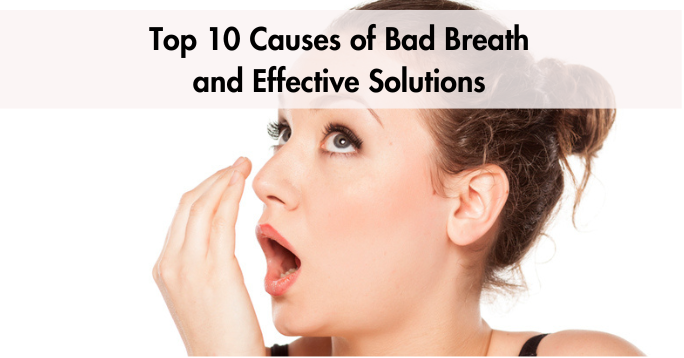Bad breath, medically termed halitosis, can be a persistent and embarrassing condition that affects millions worldwide.
While occasional bad breath is normal, chronic halitosis can significantly impact an individual's quality of life, social interactions, and self-esteem.
In this comprehensive blog post, we'll delve into the top 10 causes of bad breath, explore their underlying mechanisms, and provide evidence-based solutions to help you banish bad breath for good.
1. Poor Oral Hygiene:
Inadequate brushing and flossing allow food particles and plaque to accumulate on the teeth, gums, and tongue, fostering bacterial growth and causing bad breath.
Solution: Establish a meticulous oral hygiene routine, including brushing teeth at least twice daily with fluoride toothpaste, flossing once a day, and using an antimicrobial mouthwash to reduce bacteria and freshen breath.
2. Bacterial Overgrowth on the Tongue:
The rough surface of the tongue provides an ideal environment for bacteria and food debris to accumulate, leading to foul-smelling breath.
Solution: Use a tongue scraper or brush to clean the tongue's surface thoroughly, removing bacteria and debris that contribute to bad breath.
3. Dry Mouth (Xerostomia):
Reduced saliva production, often caused by dehydration, medications, or medical conditions, can lead to dry mouth and bad breath.
Solution: Stay hydrated by drinking plenty of water throughout the day, chew sugar-free gum or suck on sugar-free candies to stimulate saliva flow, and consider using saliva substitutes or prescription medications to alleviate dry mouth symptoms.
4. Dental Issues:
Untreated dental problems such as cavities, gum disease, and oral infections can harbour bacteria and emit foul odours.
Solution: Schedule regular dental check-ups and cleanings to address dental issues promptly, practice good oral hygiene, and follow your dentist's recommendations for treatment and maintenance.
5. Smoking and Tobacco Use:
Tobacco products not only stain teeth and contribute to gum disease but also leave a distinct odour in the mouth and on the breath.
Solution: Quit smoking or using tobacco products to improve oral health and eliminate tobacco-related bad breath.
6. Dietary Habits:
Certain foods and beverages, such as onions, garlic, coffee, and alcohol, contain volatile compounds that can linger in the mouth and contribute to bad breath.
Solution: Limit consumption of odor-causing foods and beverages, brush teeth after meals, and use sugar-free gum or mouthwash to freshen breath.
7. Sinus and Respiratory Infections:
Infections in the sinuses or respiratory tract can lead to postnasal drip, causing bad breath when bacteria break down mucus in the throat.
Solution: Treat underlying sinus or respiratory infections with medications prescribed by a healthcare professional, practice good nasal hygiene, and use saline nasal sprays to reduce mucus buildup.
8. Digestive Disorders:
Gastrointestinal issues such as acid reflux, GERD (gastroesophageal reflux disease), and digestive disorders can cause stomach acids to rise up into the esophagus and mouth, leading to halitosis.
Solution: Manage digestive disorders with dietary modifications, medications, and lifestyle changes prescribed by a healthcare provider to alleviate symptoms and improve breath odour.
9. Systemic Diseases:
Certain systemic conditions like diabetes, liver disease, kidney failure, and respiratory infections can cause breath odour due to metabolic byproducts or underlying health issues.
Solution: Seek medical evaluation and treatment for underlying systemic conditions to address their impact on breath odor and overall health.
10. Stress and Anxiety:
Stress and anxiety can lead to dry mouth, altered breathing patterns, and changes in saliva composition, all of which can contribute to bad breath.
Solution: Practice stress-reduction techniques such as meditation, deep breathing exercises, and regular physical activity to manage stress and improve oral health.
Conclusion:
Halitosis can be a persistent and distressing condition, but with proper understanding and proactive management, it's often manageable. By addressing the underlying causes of bad breath and implementing effective solutions, you can improve your oral health, boost your confidence, and enjoy fresher breath.
Remember to prioritize regular dental check-ups, maintain a healthy lifestyle, and seek medical attention for persistent or chronic halitosis to ensure optimal oral and overall health.
With the right approach, you can banish bad breath and breathe easy once again.
